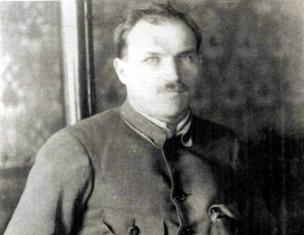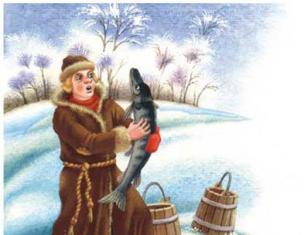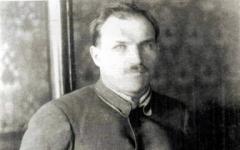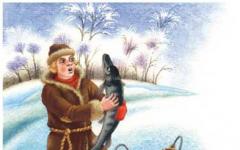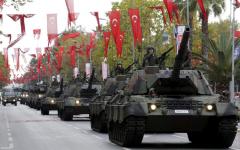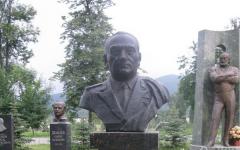This page provides material useful both for the Russian language teacher and for all 10th grade students. Students will be able to consolidate the material they have covered and prepare for participation in the Russian Language Olympiad by solving tasks compiled on this website.
Below are real examples olympiad assignments different types: test tasks, open questions and creative direction assignments. The training set of tasks can be used in lessons. If a student easily completed all the tasks, then he is ready for the Olympiad and will be able to achieve a good result.
Our site will also help those who prepare on their own. At the bottom of the page are the correct answers and example solutions, so the student can test himself.
Olympiad in Russian language 10th grade
Download the assignments by filling out the form!
After you provide the data, the download button will become active.
Test tasks
1. Which of these verbs does not have a meaning associated with heat?
A) heat up
B) warm up
B) warm up
D) warm up
D) warm up
2. Which word is formed differently than the others?
A) stand
B) selection
B) step
D) support
D) cutting
3. In which of these pairs should the nouns be swapped?
A) ice hole - ice hole
B) park - forest
B) lake - pond
D) river - canal
D) there is no such pair
4. Choose a word that refers to only one part of speech:
A) but
B) already
B) tea
D) after all
D) they say
5. Which noun cannot be animate?
A) face
B) subject
B) type
D) variety
D) fruit
6. Some linguists believe that Russian word“a la” (e.g., “hairstyle a la Sophie
Lauren") is a preposition. Which case controls this preposition?
A) nominative
B) genitive
B) dative
D) accusative
D) instrumental
7. Which of the following sentences contains a grammatical error?
A) A significantly smaller number of voters took part in the voting than four
years ago.
B) At the matinee there were not only first-graders, but also significantly younger children.
C) Nowadays, marriages take place at a much older age than a hundred years ago.
D) Tolstoy was significantly older than Chekhov, but died six years later.
E) There are no grammatical errors in sentences 1)–4).
8. B Polish language there are two words corresponding to the Russian “what” - co (tso) and że
(same). Given are sentences in which the word “what” is translated into Polish:
1. My friends don’t yet know what (co) happened yesterday.
2. The teacher thinks that (że) no one cheats.
3. I already saw what (co) Arkadiusz brought me.
Two more proposals are given.
4. I'm sure there's something wrong here.
5. Katarzyna guesses that Wojciech will write to her.
How would the word “what” in these sentences be translated into Polish?
A) 4 - co, 5 - że
B) 4 - że, 5 - co
B) 4 - co, 5 - co/że
D) 4 - że, 5 - co/że
D) 4 - co/że, 5 - że
9. In the novel “The Twelve Chairs” by I. Ilf and E. Petrov, the chairman of Starkomkhoz Gavrilin, at a ceremonial meeting on the occasion of the opening of the Stargorod tram, says: “And I think so, comrades, that this tram, which is now leaving the depot, thanks to whom it was released ? Of course, comrades, thanks to you, thanks to all the workers who really worked not out of fear, but, comrades, out of conscience.” What places need fixing?
A) from the depot;
B) thanks to whom;
C) thanks to you;
D) thanks to all the workers;
D) not for fear.
10. Which of these words can be understood as a genitive form?
A) nothing
B) a little
B) why
D) hollow
D) half past one
Open questions
Question 1
What lexical-grammatical function are the words below combined? Give them a grammatical description. Which words do you know the meaning of?
Indigo, marengo, prune, khaki, panse, beige, electric, massaka.
Question 2
What does the expression “beaten hour” mean? What is its origin?
Question 3
Put emphasis on the following words.
Pamper, gas pipeline, blinds, rust, regular, cough, prettier, otherwise, nap, quarter.
Question 4
It just so happened that, unfortunately, the letter e is constantly replaced in books and newspapers by the letter e.
It’s not surprising to completely forget where E is written, where E is written.
Indicate in which words only E is written and pronounced:
Custody, scam, shuttle, newborn.
Question 5
Which words have the stress on the last syllable?
Blinds, gas pipeline, fortune teller, call, oil pipeline, catalogue.
Creative tasks
Task 1
How should the punctuation of the passage be changed to make it clear that the author of the letter is not so much referring to the cattle belonging to the governor, but to the governor himself, whom the author is not averse to calling out cattle?
I never ordered the governor’s cattle from his fields to be driven into my nooks, and I don’t want to have his cattle anywhere near me and my four-legged animals; but I’m afraid that my steward from the village of Poganets, out of stupidity, has driven the governor’s cattle.
Task 2
Kofiy, kofiy, kohey, kokhvay. These are the names of the drink you know.
Read the sentences given in the task and determine why this word “dropped out” from the list of common, inanimate, neuter nouns:
- “Whoever drinks black coffee forges a forge against God.”
- “They sat Ani at the oak table, gave him tea and kohvai.”
- “There will be tea and coffee...”
- “Is your coffee ready?” ("The Cherry Orchard")
Determine the gender of this word in modern Russian. Give examples.
Task 3
In our language there are many “paired words”: watchman-guard, Milky - milk, tree - tree. In the roots of these words, full-vowel and half-vowel combinations of letters alternate. Write what you know about this phonetic phenomenon in Russian.
This phonetic phenomenon underlies the name of the Smorodina River, familiar to you from fairy tales and epics. Do you think such a river really existed? What could its name mean? Give reasons for your answer
Task 4
In modern Russian the word “to soar” is known, that is, “to move, to rush in the heights.”
To have your head in the clouds (also translated: to indulge in fruitless dreams, to forget about reality).
To soar in the world of dreams (translated).
But, as you can see, all meanings of this word– portable. What is the direct meaning of the word “to soar”
Task 5
Correct grammatical errors in the examples given.
A) The mother loved and was proud of her son.
B) A memorial monument is installed on the square.
D) An unpleasant incident happened to him.
Answers to tests
| Test task | № 1 | № 2 | № 3 | № 4 | № 5 |
| Answer | B | IN | B | G | G |
| Test task | № 6 | № 7 | № 8 | № 9 | № 10 |
| Answer | A | IN | G | A, B, G | A, B, D |
Answers to discovery questions
Answer to question 1: These are color words.
These are indeclinable (unchangeable) adjectives; in a sentence are a definition.
Indigo is a blue color. Marengo – black with a gray tint or black with light splashes. Prune is a dark purple color. Khaki – brown-green. Panse is dark purple. Beige is light brown with a yellowish or grayish tint. Electric is a bright blue color with a grayish tint. Massaka is a dark red color with a bluish tint.
Answer to question 2: For an hour - a whole hour.
Associated with the striking of a clock, literally “from one striking of the clock to the next”
Answer to question 3: Pamper, gas pipeline, blinds, rust, regular, cough, prettier, otherwise, nap, quarter.
Answer to question 4: It spells E in a nutshell: guardianship, scam.
Answer to question 5: In all words.
Blinds, gas pipeline, witch, call, oil pipeline, catalog
Answers to creative tasks
An example of an answer to creative task No. 1: I never ordered the governor’s cattle from his fields to be driven into my nooks, and I don’t want to have them, the cattle, anywhere near me and my four-legged animals; but I’m afraid that my steward from the village of Poganets, out of stupidity, has driven the governor’s cattle.
Example of an answer to creative task No. 2 The word coffee in modern Russian is masculine. Allowed - neuter gender.
Example of an answer to creative task No. 3 Words with incomplete consonance came to us in the Russian language from Old Church Slavonic. The presence of disagreement is a sign of Old Slavonicisms. They were considered words of solemn high style.
The Currant River is an epic, ominous river. Currants are stinking, smelling of stench.
Example of an answer to creative task No. 4 Soar - live, abide. OBVitati – loss of root B – habitation. Soar – dwell – vitalnitsa (room for living) – related words
Example of an answer to creative task No. 5 A) The mother loved and was proud of her son. — The mother loved her son and was proud of him.
B) The witness testified that he saw the accused on January 24.
The witness testified that he saw...
B) A memorial monument is installed on the square. — The monument is installed on the square.
D) An unpleasant incident happened to him. — There was an incident with him.
Olympiads in Russian language grade 10 with answers
1. Norms of the Russian literary language
1. Correct grammatical errors in the examples given.
A) The mother loved and was proud of her son.
B) A memorial monument is installed on the square.
D) An unpleasant incident happened to him.
2. It just so happened that, unfortunately, the letter e is constantly replaced by the letter e in books and newspapers.
It’s not surprising to completely forget where E is written, where E is written.
Indicate in which words only E is written and pronounced:
Custody, scam, shuttle, newborn.
3. Kofiy, kofiy, kohey, kokhvay. These are the names of the drink you know.
Read the sentences given in the task and determine why this word “dropped out” from the list of common, inanimate, neuter nouns:
- “Whoever drinks black coffee forges a forge against God.”
- “They seated Ani at the oak table, gave him tea and kohvai.”
- “There will be tea and coffee…”
- “Is your coffee ready?” ("The Cherry Orchard")
Determine the gender of this word in modern Russian. Give examples.
4. In which words does the stress fall on the last syllable?
Blinds, gas pipeline, fortune teller, call, oil pipeline, catalogue.
II. History of the Russian language
1. We are accustomed to calling the name of Bulgarian sour milk, Turkic in origin, yogurt. This spelling of the word is inaccurate. How should this word be written correctly?
2. Compare the use of the words year and godina in the given sentences. Do these cognate words differ significantly in their sphere of use? What is further fate these words? Give examples.
A) “Her year has come, when will the child be born” (Ostromir Gospel)
B) “The time will come that the Son of Man will be glorified” (Ostromir Gospel).
3. In our language there are many “paired words”: watchman-guard, Milky - milk, tree - tree. In the roots of these words, full-vowel and half-vowel combinations of letters alternate. Write what you know about this phonetic phenomenon in Russian.
This phonetic phenomenon underlies the name of the Smorodina River, familiar to you from fairy tales and epics. Do you think such a river really existed? What could its name mean? Give reasons for your answer.
1. Read the poem by A.S. Pushkin’s “The Youth” (1830) and conduct a linguistic analysis of the poem (speech studies, language).
The fisherman spread the net along the shore of the icy sea;
The boy helped his father. Boy, leave the fisherman!
Other things await you, other worries:
If you catch minds, you will be an assistant to kings.
2. Read the words: flow, stream, east, run away.
Are these words the same root? Prove your point.
Which interpretation of the word “flow” do you consider more historically correct and why:
a) “Move measuredly, calmly, follow, pass, leave, continue”;
b) “Move quickly, run”?
IV. Modern Russian language
1. Outstanding philologist of the twentieth century V.V. Vinogradov in his fundamental work “Russian Language. The grammatical doctrine of the word" (1947) called the pronoun a special part of speech in the modern Russian language. And the great Russian poet of the 19th century A.S. Pushkin in the poem “You and You” masterfully used the forms of personal pronouns you and you.
Why do you think the scientist characterized pronouns this way? What semantic features of personal pronouns did A.S. use? Pushkin in his poem?
You and you
Empty you are heartfelt you
She, having mentioned, replaced
And all the happy dreams
It aroused the soul of the lover.
I stand before her thoughtfully,
There is no strength to take your eyes off her;
And I tell her: how sweet you are!
And I think: how I love you!
(A.S. Pushkin)
2. Classify languages into four language families:
Indo-European family:
Ural (Finno-Ugric) family:
Turkic family:
Caucasian family:
Tatar, Spanish, German, Hungarian, Lithuanian, Russian, Greek, Azerbaijani, Georgian, Finnish, Turkish, Iranian, Estonian
3. Given are Polish words in the accepted spelling and words in somewhat simplified Russian transcription - their Russian equivalents:
rybak - [fisherman] fisherman morzyla - [mozhyla] stained
rzeka - [zheka] river czart - [chart] damn
tarli - [tarli] rubbed orzech - [ozhekh] nut
In which of the following Polish words is the letter combination read differently than in the others?
A) rzepa B) gorzeli C) burza D) grzech E) marzla
4. Find a pair in which the words have the same endings:
A) Dining room - flock
B) The tailor is a hero
B) Fisherman - worker
D) Lecture hall - fox
5. Do the sentences differ in composition? Give reasons for your answer.
A) A delightful overnight stay on the road.
B) Overnight en route due to bad weather.
6. Tell us about hard unpaired consonant sounds in the Russian language.
7. In modern Russian the word “to soar” is known, that is, “to move, to rush in the heights.”
To have your head in the clouds (also translated: to indulge in fruitless dreams, to forget about reality).
To soar in the world of dreams (translated).
But, as you can see, all meanings of this word are figurative. What is the direct meaning of the word “to soar”?
8. Give an interpretation of the linguistic term paronym. Give examples.
V. Creative work
Write a miniature essay in an artistic style in the genre of a story on the topic “Book”.
Answers to the Russian language Olympiad, grade 10:
I. Norms of the Russian literary language
1.
A) The mother loved and was proud of her son. - The mother loved her son and was proud of him.
B) The witness testified that he saw the accused on January 24.
The witness testified that he saw...
B) A memorial monument is installed on the square. - The monument is installed on the square.
D) An unpleasant incident happened to him. - There was an incident with him.
2.
It spells E in a nutshell: guardianship, scam.
3.
1. Words coffee, coffee, etc. were masculine. The word coffee is closely associated with these older forms. By the end of the 19th century they became colloquial. And the preserved form of the word COFFEE (masculine) entered our standardized literary language.
2. The word coffee in modern Russian is masculine. Allowed - neuter gender.
4.
In all words.
Blinds, gas pipeline, fortune teller, call, oil pipeline, catalogue.
II. History of the Russian language
1.
The combination of letters YO is uncharacteristic for the Russian language. This combination is expressed by the letter E. The correct spelling is yogurt, yoghurt.
2.
A year is a concept of time not marked by any exceptional events, that is, of time as such.
Godina is a derivative of “year”; the word emphasized the special, emotional nature of the time it denotes. This time was characterized by the most significant events and phenomena (the year of salvation, the year of marriage). For example, in “The Tale of Igor’s Campaign” it is said: “Already, brethren, a sad time has arisen.”
The noun year with the meaning time fell out of use - it was supplanted by borrowing “time” from the Old Church Slavonic language. The word refers to neutral vocabulary. The stylistically colored word godina received a sublime stylistic connotation (a time of troubles, adversity, trials...). This was facilitated by the suffix –in-, emphasizing the expressiveness and emotionality of the word’s meaning.
3.
1. Words with incomplete agreement came to us in the Russian language from Old Church Slavonic. The presence of disagreement is a sign of Old Slavonicisms. They were considered words of solemn high style.
2. The Smorodina River is an epic, ominous river. Currants are stinking, smelling of stench.
III. Language of works of art
1.
The answer to the question is creative.
2.
1. These words are cognate, since they have the same root: -tek- (in the word flow), -tok- (flow), -tok- (east), - tek- (nautek);
Historical root with alternating vowels E\O and Shch\Ch\K (mother-in-law - old school). The initial meaning of the verb TESCHI is “to run, to move quickly.”
In the modern Russian language, only in the dialect nautek the memory of the original meaning of the word (to move quickly) has been preserved.
IV. Modern Russian language
1.
1. Pronoun, according to the outstanding philologist V.V. Vinogradov, a special part of speech in modern Russian. Firstly, a pronoun is a part of speech that does not have its own meaning, but replaces words of other parts of speech. For example, in the phrase Yesterday we met a neighbor, he was very old, the pronoun HE replaces the noun neighbor. With the help of pronouns, the speaker either points to a person, object, sign, quantity, or generalizes them, but does not name them. For example, with the pronoun such a speaker indicates a sign, with the pronoun so much - with the quantity, and with the help interrogative pronoun Who? asks about a face or persons. No other independent part speech has no such feature. Secondly, the peculiarity of pronouns is that they allow you to avoid repetition of words in the text, since they are a means of communication between parts of sentences and sentences as a whole: Yesterday we met a neighbor, he was very old. The pronoun OH in this sentence is a means of communication.
2. One more interesting feature pronouns – the personal pronouns you and you form the basis speech etiquette: YOU are used to address each other in the family, between relatives, friends; on YOU - people little known and unfamiliar. The pronoun YOU is also accepted in official and official settings.
A.S. Pushkin uses precisely this semantic feature of personal pronouns. Lyrical hero A.S. Pushkina speaks of the desire to move from official relationships to loved ones, hence the cordial you.
2.
Indo-European family: Spanish, German, Lithuanian, Russian, Greek, Iranian.
Uralic (Finno-Ugric) family: Hungarian, Finnish, Estonian.
Turkic family: Tatar, Azerbaijani, Turkish.
Caucasian family: Georgian.
3.
The following pronunciation correspondences are observed between Polish and Russian words: b-b, k-k, x –ch [x], ch – cz [ch], p (hard) - r, p (soft) - rz [z], l (hard) - l, l (soft) - li. In addition, Polish [a] can correspond to Russian. This correspondence occurs before two consonants. Now let’s try to write down these words in transcription and translate them into Russian:
rzepa – [zhepa] – turnip. Everything is fine.
gorzeli - [gozhel] - burned. Everything is fine again.
burza – [buzha] – storm. No problem.
grzech - [gzhekh] - sin. Everything is fine.
This means that the correct answer is D): marzla – [majla].
According to the rules established above, the Polish [majla] must correspond to the Russian merla. But there is no such word in Russian.
4.
Answer: D). The words fox and lecturer have a zero ending.
A) Dining room - flock (in the word dining room the ending is aya, in the word flock - ya).
B) Tailor is a hero (in the word hero there is a zero ending, in the word tailor – oh.)
C) Rybachy – worker (In the word fisherman there is a zero ending, in the word worker there is a zero ending).
5.
The proposals differ in composition.
1. A delightful overnight stay on the road. A one-part sentence, nominative, is distributed only by definitions, agreed and inconsistent.
2. Overnight on the way due to bad weather. A two-part sentence, incomplete, there is no predicate, but there is a circumstance of the reason related to the predicate, common).
6.
In the Russian language there are paired and unpaired hard consonants. For example: [B] - [B], [T] - [T], etc. Always solid unpaired ones are [zh], [w], [ts]. Once upon a time, the sounds [zh], [sh], [t] were soft and words with them were written like this: belly, awl. In the 13th century, the hardening of hissing [zh], [sh], and in the 14th-15th centuries - [ts] occurred. Words with these sounds began to be pronounced firmly, but the spelling remained the same. The letter I after Zh, Sh, Ts recalls the former softness of hissing sounds and the sound [ts]. The final hardening of the sound [ts] in the 16th - 17th centuries. reflected in the letter: fathers, streets, Lisitsyn, chubby.
We write: “The gypsy on tiptoe tutted to the chicken: “Tsits!”
After the hardening of C in the Russian language, after this letter, it became possible to write the letter O with an accent, E - without an accent: seltso-towel.
7.
Soar - live, abide. OBVitati – loss of root B – habitation. Soar - dwell - vital (room for living) - related words.
8.
Paronym - from Greek. para – near, past and onyma – name. Words similar in sound, but different in meaning and structure. Subscription - subscriber, bone - bony - inert.
1. Which word is formed differently than the others?
A) standB) selectionB) stepD) supportD) cutting
2.
Choose a word that refers to only one part of speech:
A) butB) alreadyB) teaD) after allD) they say
3. Some linguists believe that the Russian word “a-la” (for example, “hairstyle a la Sophie”
Lauren") is a preposition. Which case controls this preposition?A) nominativeB) genitiveB) dativeD) accusativeD) instrumental
4. Place emphasis on the following words:
Pamper, gas pipeline, blinds, rust, regular, cough, prettier, otherwise, nap, quarter.
5. What lexical-grammatical function are the words below combined? Give them a grammatical description. Which words do you know the meaning of?Indigo, marengo, prune, khaki, panse, beige, electric, massaka.
6. In our language there are many “paired words”: watchman-guard, Milky - milk, tree - tree. In the roots of these words, full-vowel and half-vowel combinations of letters alternate. Write what you know about this phonetic phenomenon in Russian.This phonetic phenomenon underlies the name of the Smorodina River, familiar to you from fairy tales and epics. Do you think such a river really existed? What could its name mean? Give reasons for your answer
7. Correct grammatical errors in the examples given:
A) The mother loved and was proud of her son.B) A memorial monument is installed on the square.D) An unpleasant incident happened to him.
Answers. Russian language. 11th grade
1.B) 1 point
2.D) 1 point
3.A) 1 point
4. Pamper, gas pipeline, blinds, rust, regular, cough, prettier, otherwise, nap, quarter.
For each correct word - 1 point
10
5. These are color words.These are indeclinable (unchangeable) adjectives; in a sentence are a definition.Indigo is a blue color. Marengo – black with a gray tint or black with light splashes. Prune is a dark purple color. Khaki – brown-green. Panse is dark purple. Beige is light brown with a yellowish or grayish tint. Electric is a bright blue color with a grayish tint. Massaka is a dark red color with a bluish tint.
For each correct answer - 1 point
Maximum points:8
6. Words with disagreement came to us in the Russian language from Old Church Slavonic. The presence of disagreement is a sign of Old Slavonicisms. They were considered words of solemn high style - 1 pointThe Currant River is an epic, ominous river. Currants – stinking, smelling of stench -1 point
Maximum points:2
7. A) The mother loved and was proud of her son. - The mother loved her son and was proud of him.B) The witness testified that he saw the accused on January 24.The witness testified that he saw...B) A memorial monument is installed on the square. - The monument is installed on the square.D) An unpleasant incident happened to him. - There was an incident with him.
For each correct answer - 1 point
Maximum points:4
Maximum points for the entire work:27
1. Norms of the Russian language.
1. Correct grammatical errors in the examples given. .
A) The mother loved and was proud of her son.
B) A memorial monument is installed on the square.
D) An unpleasant incident happened to him.
2. It just so happened that, unfortunately, the letter e is constantly replaced in books and newspapers by the letter e. It’s not surprising to completely forget where it’s written Yo, Where E.
Indicate which words are written and pronounced only E:
Custody, scam, shuttle, newborn.
3. Every schoolchild knows what difficulties it is to write words with unverified unstressed vowels at the root, especially if these are words of foreign origin. For example, how should one write : currency or volute, company or campaign? Give reasons for your answer.
Which words have the stress on the last syllable? ?
Blinds, gas pipeline, fortune teller, will call, oil pipeline, catalog.
5. Insert the missing spellings according to the literary norms of the Russian language .
An unprecedented...inc...ident.
At the police station they...identified the compromised rowdy. He turned out to be a kindergarten teacher. “It’s a strange conjuncture these days,” the police stated. “Teachers are not our contingent.”
2. History of the Russian language.
1. Read the sentence. Answer the questions.
“The weather is wonderful in summer: the rain flies, the god shoots arrows and thunder...”(Northern dialect, northeastern dialect zone).
A) Why is the weather called “wonderful” if there is rain, thunderstorm, thunder?
B) Why does the rain “fly” and not “go”?
2. Compare the use of the words year and godina in the given sentences. Do these cognate words differ significantly in their sphere of use? What is the future fate of these words? Give examples.
A) “Her year has come, when will the child be born”(Ostromir Gospel).
B) “The time will come that the Son of Man will be glorified”(Ostromir Gospel).
There are many “pair words” in our language: watchman - guardian, Milky - milk, tree - tree. In the roots of these words, full-vowel and half-vowel combinations of letters alternate. Write what you know about this phonetic phenomenon in Russian.
This phonetic phenomenon underlies the name of the Smorodina River, familiar to you from fairy tales and epics. Do you think such a river really existed? What could its name mean? Give reasons for your answer.
3. Language of works of art.
Read a fragment of a poem by P. A. Vyazemsky:
God of potholes, god of blizzards,
God of the country roads
God of nights without beds,
Here it is, here it is, the Russian god.
What Russian proverb, reflecting the typically Russian, folk attitude to life, is “encrypted” in this fragment?
Read fragments of folk songs and tales.
A) Your good horse has come off
From that pillarMalinova.
B) There is a forest on the shore
AllMalinov
What do the underlined short adjectives mean? What aesthetic function do they perform?
Determine by what means a linguistic pun is created in the examples below.
A) How are you not tired of swearing?
My calculation with you is short:
Well, I'm idle, I'm idle,
And you're a business slacker.
(“How are you not tired of swearing?”)
B) They once asked an old peasant woman if she married out of passion? “Out of passion,” answered the old woman, “I was stubborn, but the headman threatened to whip me.”
(A. N. Radishchev “Journey from St. Petersburg to Moscow”).
Olympiad in Russian language 10th grade
Olympiad in Russian language 10th grade
1. Norms of the Russian literary language
1. Correct grammatical errors in the examples given.A) The mother loved and was proud of her son.
B) The witness testified that he saw the accused on January 24.
B) A memorial monument is installed on the square.
D) An unpleasant incident happened to him.
2. It just so happened that, unfortunately, the letter e is constantly replaced by the letter e in books and newspapers.
It’s not surprising to completely forget where E is written, where E is written.
Indicate in which words only E is written and pronounced:
Custody, scam, shuttle, newborn.
3. Kofiy, kofiy, kohey, kokhvay. These are the names of the drink you know.
Read the sentences given in the task and determine why this word “dropped out” from the list of common, inanimate, neuter nouns:
- “Whoever drinks black coffee forges a forge against God.”
- “They seated Ani at the oak table, gave him tea and kohvai.”
- “There will be tea and coffee…”
- “Is your coffee ready?” ("The Cherry Orchard")
Determine the gender of this word in modern Russian. Give examples.
4. In which words does the stress fall on the last syllable?
Blinds, gas pipeline, fortune teller, call, oil pipeline, catalogue.
II. History of the Russian language
1. We are accustomed to calling the name of Bulgarian sour milk, Turkic in origin, yogurt. This spelling of the word is inaccurate. How should this word be written correctly?2. Compare the use of the words year and godina in the given sentences. Do these cognate words differ significantly in their sphere of use? What is the future fate of these words? Give examples.
A) “Her year has come, when will the child be born” (Ostromir Gospel)
B) “The time will come that the Son of Man will be glorified” (Ostromir Gospel).
3. In our language there are many “paired words”: watchman-guard, Milky - milk, tree - tree. In the roots of these words, full-vowel and half-vowel combinations of letters alternate. Write what you know about this phonetic phenomenon in Russian.
This phonetic phenomenon underlies the name of the Smorodina River, familiar to you from fairy tales and epics. Do you think such a river really existed? What could its name mean? Give reasons for your answer.
III. Language of works of art
1. Read the poem by A.S. Pushkin’s “The Youth” (1830) and conduct a linguistic analysis of the poem (speech studies, language).The fisherman spread the net along the shore of the icy sea;
The boy helped his father. Boy, leave the fisherman!
Other things await you, other worries:
If you catch minds, you will be an assistant to kings.
2. Read the words: flow, stream, east, run away.
Are these words the same root? Prove your point.
Which interpretation of the word “flow” do you consider more historically correct and why:
a) “Move measuredly, calmly, follow, pass, leave, continue”;
b) “Move quickly, run”?
IV. Modern Russian language
1. Outstanding philologist of the twentieth century V.V. Vinogradov in his fundamental work “Russian Language. The grammatical doctrine of the word" (1947) called the pronoun a special part of speech in the modern Russian language. And the great Russian poet of the 19th century A.S. Pushkin in the poem “You and You” masterfully used the forms of personal pronouns you and you.Why do you think the scientist characterized pronouns this way? What semantic features of personal pronouns did A.S. use? Pushkin in his poem?
You and you
Empty you are heartfelt you
She, having mentioned, replaced
And all the happy dreams
It aroused the soul of the lover.
I stand before her thoughtfully,
There is no strength to take your eyes off her;
And I tell her: how sweet you are!
And I think: how I love you!
(A.S. Pushkin)
2. Classify languages into four language families:
Indo-European family:
Ural (Finno-Ugric) family:
Turkic family:
Caucasian family:
Tatar, Spanish, German, Hungarian, Lithuanian, Russian, Greek, Azerbaijani, Georgian, Finnish, Turkish, Iranian, Estonian
3. Given are Polish words in the accepted spelling and words in somewhat simplified Russian transcription - their Russian equivalents:
rybak - [fisherman] fisherman morzyla - [mozhyla] stained
rzeka - [zheka] river czart - [chart] damn
tarli - [tarli] rubbed orzech - [ozhekh] nut
In which of the following Polish words is the letter combination read differently than in the others?
A) rzepa B) gorzeli C) burza D) grzech E) marzla
4. Find a pair in which the words have the same endings:
A) Dining room - flock
B) The tailor is a hero
B) Fisherman - worker
D) Lecture hall - fox
5. Do the sentences differ in composition? Give reasons for your answer.
A) A delightful overnight stay on the road.
B) Overnight en route due to bad weather.
6. Tell us about hard unpaired consonant sounds in the Russian language.
7. In modern Russian the word “to soar” is known, that is, “to move, to rush in the heights.”
To have your head in the clouds (also translated: to indulge in fruitless dreams, to forget about reality).
To soar in the world of dreams (translated).
But, as you can see, all meanings of this word are figurative. What is the direct meaning of the word “to soar”?
8. Give an interpretation of the linguistic term paronym. Give examples.
V. Creative work
Write a miniature essay in an artistic style in the genre of a story on the topic “Book”.
